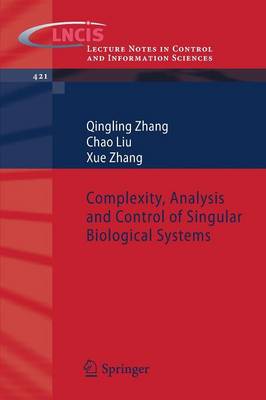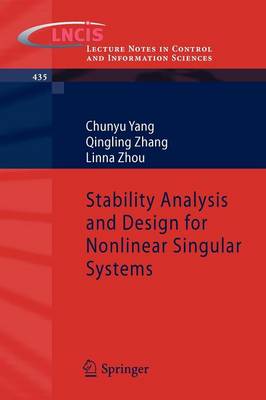Lecture Notes in Control and Information Sciences
2 primary works
Book 421
Complexity, Analysis and Control of Singular Biological Systems
by Qingling Zhang, Chao Liu, and Xue Zhang
The book begins from the essentials of singular systems theory and bifurcations before tackling the use of various forms of control in singular biological systems using examples including predator-prey relationships and viral vaccination and quarantine control. Researchers and graduate students studying the control of complex biological systems are shown how a variety of methods can be brought to bear and practitioners working with the economics of biological systems and their control will also find the monograph illuminating.
Book 435
Stability Analysis and Design for Nonlinear Singular Systems
by Chunyu Yang, Qingling Zhang, and Linna Zhou
Singular systems which are also referred to as descriptor systems, semi-state systems, differential- algebraic systems or generalized state-space systems have attracted much attention because of their extensive applications in the Leontief dynamic model, electrical and mechanical models, etc. This monograph presented up-to-date research developments and references on stability analysis and design of nonlinear singular systems. It investigated the problems of practical stability, strongly absolute stability, input-state stability and observer design for nonlinear singular systems and the problems of absolute stability and multi-objective control for nonlinear singularly perturbed systems by using Lyapunov stability theory, comparison principle, S-procedure and linear matrix inequality (LMI), etc.
Practical stability, being quite different from stability in the sense of Lyapunov, is a significant performance specification from an engineering point of view. The basic concepts and results on practical stability for standard state-space systems were generalized to singular systems. For Lur'e type descriptor systems (LDS) which were the feedback interconnection of a descriptor system with a static nonlinearity, strongly absolute stability was defined and Circle criterion and Popov criterion were derived. The notion of input-state stability (ISS) for nonlinear singular systems was defined based on the concept of ISS for standard state-space systems and the characteristics of singular systems. LMI-based sufficient conditions for ISS of Lur'e singular systems were proposed. Furthermore, observer design for nonlinear singular systems was studied and some observer design methods were proposed by the obtained stability results and convex optimization algorithms. Finally, absolute stability and multi-objective control of nonlinear singularly perturbed systems were considered. By Lyapunov functions, absolute stability criteria of Lur'e singularly perturbed systems were proposed and multi-objective control of T-S fuzzy singularly perturbed systems was achieved. Compared with the existing results, the obtained methods do not depend on the decomposition of the original system and can produce a determinate upper bound for the singular perturbation parameter.

